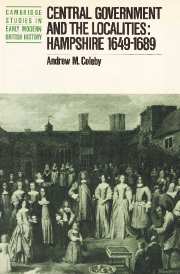Book contents
- Frontmatter
- Contents
- List of maps
- Acknowledgements
- List of abbreviations
- INTRODUCTION AND PROLOGUE
- PART I THE INTERREGNUM
- 1 LOCAL OFFICE-HOLDING 1649–60
- 2 THE ENFORCEMENT OF POLICY 1649–60
- 3 GOVERNMENT AND COUNTY 1649–60
- PART II THE RESTORATION
- PART III FROM THE POPISH PLOT TO THE REVOLUTION OF 1688
- EPILOGUE AND CONCLUSION
- Bibliography
- Index
3 - GOVERNMENT AND COUNTY 1649–60
Published online by Cambridge University Press: 14 October 2009
- Frontmatter
- Contents
- List of maps
- Acknowledgements
- List of abbreviations
- INTRODUCTION AND PROLOGUE
- PART I THE INTERREGNUM
- 1 LOCAL OFFICE-HOLDING 1649–60
- 2 THE ENFORCEMENT OF POLICY 1649–60
- 3 GOVERNMENT AND COUNTY 1649–60
- PART II THE RESTORATION
- PART III FROM THE POPISH PLOT TO THE REVOLUTION OF 1688
- EPILOGUE AND CONCLUSION
- Bibliography
- Index
Summary
It is extremely difficult to measure attitudes and reactions of people in the provinces to central government during the 1650s. This is partly a problem of evidence: for many places the silence is impenetrable. But there are also problems with interpreting the evidence that there is. For Professor Underdown, ‘There is no great mystery about the politics of the elite’ in this period, and yet his own pioneering interpretation of the subject has been questioned in the light of recent research. Underdown concedes that there is more difficulty in gauging popular opinion.
In Hampshire, as in other counties in the period, treasonable activities were the preserve of only a small minority at least before 1659. Twenty-five obscure gentlemen and others from Hampshire were taken prisoner in the west, in the wake of Penruddock's Rising in 1655. Even treasonable words were rare, or at least were rarely reported. There were only six presentments or indictments for seditious or libellous words at Hampshire quarter sessions between Easter 1646 and Michaelmas 1660.
Despite the difficulties of the evidence, many historians have argued that Interregnum governments were unpopular in the provinces, and have in turn attributed this unpopularity mainly to their supposed commitment to centralization and the extensive military presence. Unfortunately there is no commonly agreed definition of centralization and detailed local studies of the military presence and military–civilian relations are still few.
- Type
- Chapter
- Information
- Central Government and the LocalitiesHampshire 1649-1689, pp. 64 - 84Publisher: Cambridge University PressPrint publication year: 1987



